| |
 |
Four NRI Students won Gloria Barron Prize as outstanding young leaders
Gloria Barron Prize for 25 Young Heroes & outstanding young leaders ages Between 8 to 18
Los Angeles, September 26, 2020
NRIpress.club/Ramesh/Agary Singh
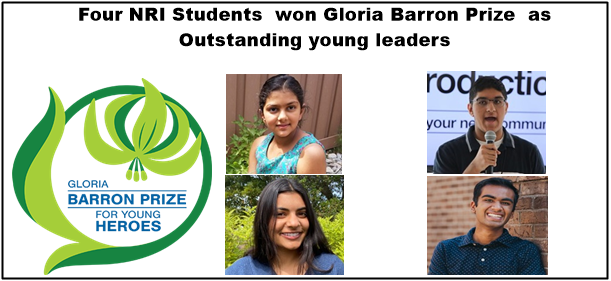
The Gloria Barron Prize for Young Heroes celebrates inspiring, public-spirited young people from diverse backgrounds all across North America. Established in 2001 by author T.A. Barron, the Barron Prize annually honors 25 outstanding young leaders ages 8 to 18 who have made a significant positive impact on people, their communities, and the environment.
Since its inception, the Barron Prize has awarded more than half a million dollars to hundreds of young leaders and has won the support of the National Geographic Education Foundation, Girl Scouts of the USA, and National Youth Leadership Council, among other organizations.
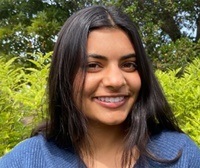 |
Kavi Dolasia co-founded Reaching Out with Robotics to increase technology literacy for underserved youth. Her program brings hands-on robotics education to disadvantaged children, students of color, and girls — groups traditionally underrepresented in STEM (Science, Technology, Engineering, and Math).
The program also reaches students with disabilities and the elderly. Over the past five years, Reaching Out with Robotics has impacted more than 4,000 students through weekly classes, monthly workshops, and STEM fairs. |
High school mentors visit middle schools, public libraries, and Boys and Girls Clubs to teach engineering and computer science basics through robotics. Kavi has grown her program into eight chapters across California and is working to expand further. Her sponsors include the National Center for Women & Information Technology (supported by Apple, Bank of America, Microsoft, and Google) and Disney Friends for Change.
Kavi fell in love with STEM as a sixth grader, one of just four girls on her school’s robotics team of 30 students. A year later, she joined her older sister in investigating why nearly all students in her high school STEM classes had attended one of the area’s two middle schools (Mill Valley), and not the other (Bayside). The girls found that 89% of students at Bayside were socio-economically disadvantaged, compared to just 7.9% at Mill Valley. The two middle schools’ vastly different test scores reflected the disparity. Kavi and her sister decided to start a weekly STEM club at Bayside — and Reaching Out with Robotics was born. Six years later, their annual robotics competition at Bayside showcases the STEM gains students there have made. Bayside is currently part of the first California school desegregation order in half a century. “The impact of my program has taught me that grassroots action can be a catalyst for tangible, lasting change,” says Kavi. “Every Monday when I walk into Bayside to teach robotics and see the triumphant smiles of students troubleshooting code, it gives me hope.” |
| |
|
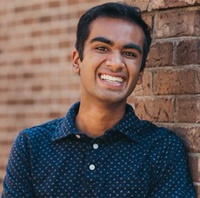 |
Kavi Gandhi directs the Yash Gandhi Foundation and in three years, has raised more than $460,000 to help find a cure for I-Cell, a rare, genetic childhood disease.
The foundation honors his older brother Yash, who passed away from I-Cell just shy of his ninth birthday, when Kavi was in first grade. The boys’ parents established the foundation in 2001, the only one in the world focused solely on I-Cell funding. They’d built a small circle of supporters but in 2016, told Kavi they planned to dissolve the foundation. Dismayed, he reflected for several days and then told his parents he wasn’t going to let that happen – that he wanted to revive the foundation and do the work himself.
|
| His parents stepped back and 13-year-old Kavi took charge. He expanded the foundation’s mission to include advocating on behalf of the I-Cell community. He overhauled its website, creating an information and networking hub for newly diagnosed families. He began building a strong social media presence that includes photos, bios, and videos of children living with I-Cell. His social campaigns have engaged nearly 200,000 people in 43 countries. An avid cross country runner, Kavi organizes the i Run for i-Cell 5K fundraiser each October. Dozens of I-Cell families from across the country gather for the race and to connect with others facing the disease. Kavi donates all race proceeds to prominent I-Cell researchers. His foundation has prompted a renaissance in research into the disease. “I’ve met so many heroes through my work – people who are endlessly passionate about their causes,” says Kavi. “I’m so hopeful about the continued positive impact that heroes, young and old, can bring to this world.” |
| |
|
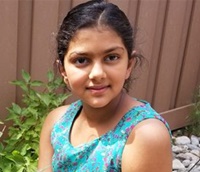 |
Madhvi Chittoor founded Madhvi4EcoEthics to reduce plastic and Styrofoam pollution and inspire others to do the same. A black belt in Taekwondo, she calls herself the No Styrofoam Ninja. She speaks at environmental events across the country and shared the stage with Greta Thunberg at Denver’s Global Climate Strike in October 2019. She has worked with her district congressman and the governor of Colorado to have April declared as Plastic and Styrofoam Pollution Awareness Month in Colorado. Madhvi spent much of the past year gathering signatures to convince state legislators to propose a statewide ban on Styrofoam take-out containers and single-use plastics in restaurants and grocery stores. |
She worked nearly every weekend collecting signatures for her petition and talking with legislators and mayors across the state. The petition has been introduced as two bills that will soon be signed into law.
Madhvi’s statewide campaign builds on her success petitioning her Denver-area school district to replace Styrofoam lunch trays with sustainable ones. She worked for months to gather signatures and then brought her petition and idea to the district superintendent. He set up a task force and asked Madhvi to help lead it. She attended and spoke at all of the task force’s meetings for nearly a year. In September 2019, the Jeffco Public School district — with 86,000 students across 155 schools — made the switch to compostable paper lunch trays. The move will eliminate 7.6 million Styrofoam trays from the landfill each year. A nature and animal enthusiast, Madhvi first became aware of plastic pollution in first grade, when she learned of the Great Pacific Garbage Patch. By age 7, she’d written and published a book called Is Plastic My Food? to educate her peers about the problem. “I’ve learned that making change takes time and requires patience,” says Madhvi. “But I know that through persistence and determination, I can create change on a large scale, even though I am young.” |
| |
|
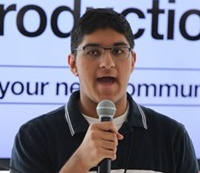 |
Viraj Mehta is passionate about developing technologies for the prevention, early detection, and treatment of cancers. His projects make use of artificial intelligence and machine learning in an effort to increase survival rates. He began his work four years ago after losing his grandfather to cancer diagnosed at a late stage. When Viraj learned that late diagnoses are especially prevalent in medically underserved areas, he created the organization OncoVision to help people in these areas screen themselves for cancer. Over three years, he conducted workshops for people in rural areas of India, Malaysia, and Poland. His OncoVision app makes the project more sustainable and can predict one’s percentage risk of eight different cancer types with 97% accuracy. |
| In creating the OncoVision app, Viraj realized the potential of emerging technologies to help patients with cancer – especially in the context of precision medicine, which focuses on personalized treatments. He established Precision Medicine Initiatives to explore technologies in this realm. In two years, he has created two web platforms. The first, miRTK, recommends personalized therapeutic treatments for cancers based on molecular analyses. The second, GLIA-Deep, which is patent-pending, holds promise for patients with glioblastoma, a deadly brain cancer that is difficult to treat with standard chemotherapy drugs. With GLIA-Deep, clinicians can upload a patient’s MRI scan and within seconds, receive an assessment of their genetics along with patient-specific drug recommendations. Viraj has won numerous awards for his work and has been invited to speak at international neuro-oncology conferences. He has validated GLIA-Deep at Mayo Clinic and is working on testing it in a clinical setting. “My journey with this work has allowed me to help people around the world and to accomplish things I didn’t think were possible,” says Viraj. “It has also taught me the importance of being grateful and has allowed me to honor my grandfather by spreading compassion in his name.” |
| |
|

|
|
|
|
|





